Growing fruit in small spaces is no longer just a dream. With the rise of compact varieties, container gardening, and vertical growth techniques, you can enjoy homegrown fruit even if you only have a patio, balcony, or small backyard. Here’s a list of easy-to-grow fruits that are perfect for confined spaces.
1. Pineapple
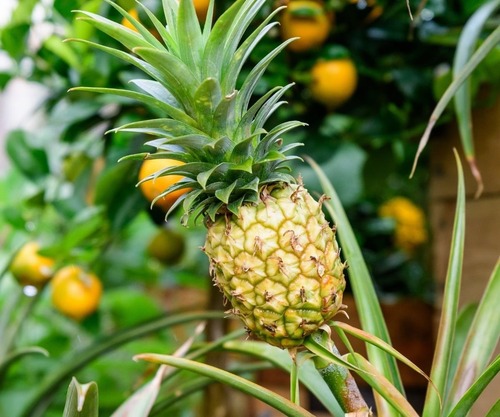
Pineapples may seem like tropical, large-space plants, but they are surprisingly suitable for container gardening. Their shallow roots and slow growth make them perfect for small spaces. Pineapples are unique in that they don’t take up much horizontal space and can even be grown indoors near a sunny window.
- Growing Requirements: Pineapples need plenty of sunlight, preferably 6-8 hours per day, and well-draining soil. They are drought-tolerant once established but require consistent moisture for healthy growth. Pineapples thrive in warm temperatures and can be moved indoors during colder months in cooler climates.
- Varieties to Try: ‘Smooth Cayenne’ and ‘Red Spanish’ are common varieties that do well in containers.
- Pro Tip: You can propagate pineapples by planting the tops of store-bought fruits. After twisting off the leafy crown, let it dry for a few days before planting in well-drained soil.
Pineapples can take a couple of years to produce fruit, but they are low-maintenance and a fun plant to watch grow.
2. Mulberries (Dwarf Varieties)
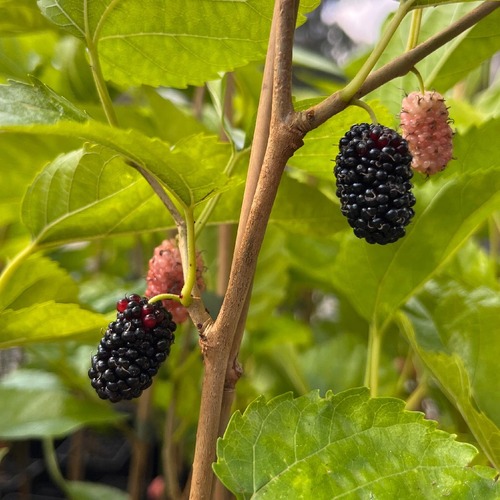
Dwarf mulberries are ideal for container gardening and small spaces. Unlike their larger counterparts, dwarf mulberry trees are compact but still produce an abundance of sweet, nutritious berries. Their ability to thrive in confined areas makes them a great choice for patios, balconies, or small garden beds.
- Growing Requirements: Mulberries prefer full sunlight and well-drained soil, though they are fairly adaptable and can tolerate partial shade. Once established, they are drought-tolerant but perform best with consistent watering, especially during fruit production.
- Varieties to Try: ‘Dwarf Everbearing Mulberry’ is a popular variety for container growth, staying compact while producing a plentiful harvest.
- Pro Tip: Prune dwarf mulberries regularly to maintain their shape and size, especially when grown in containers.
Mulberries are delicious eaten fresh, added to desserts, or made into jams, offering a great return for minimal effort.
3. Passion Fruit
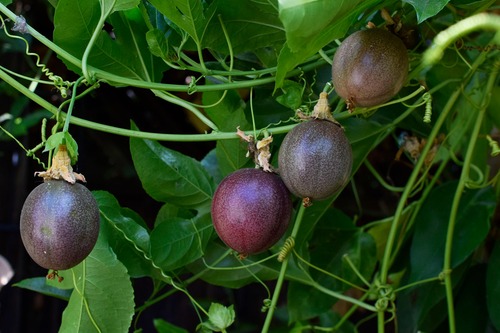
Passion fruit vines are vigorous climbers that adapt well to small spaces, particularly when grown vertically on a trellis or fence. These vines are both ornamental and productive, producing exotic, sweet-tart fruits with fragrant flowers that attract pollinators like bees and butterflies.
- Growing Requirements: Passion fruit thrives in full sun, requiring at least 6 hours of direct sunlight per day. They need well-draining soil and a sturdy support system like a trellis or arbor to grow vertically. Regular feeding with a balanced fertilizer encourages growth and fruiting.
- Varieties to Try: The ‘Purple Possum’ and ‘Frederick’ varieties are known for their compact growth habits and are great for small gardens.
- Pro Tip: Make sure to train the vine to grow along a vertical structure to save horizontal space and keep it well-pruned to prevent overgrowth.
Passion fruit can be grown in pots and moved indoors in cooler climates. Their attractive flowers and delicious fruit make them a favorite for urban gardeners.
4. Cherries (Dwarf Varieties)
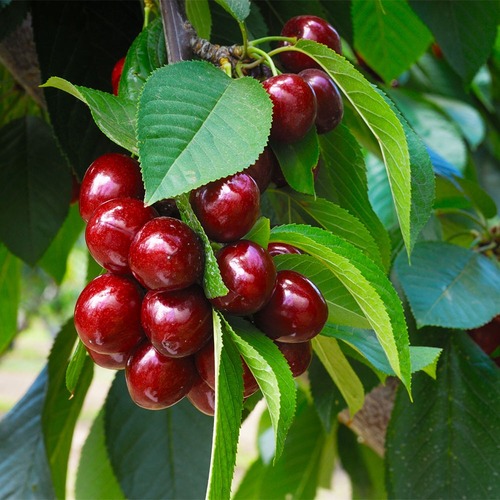
Dwarf cherry trees are perfect for small spaces because they remain compact while producing full-sized cherries. These trees grow well in large containers, making them an excellent choice for patios, balconies, or limited outdoor spaces.
- Growing Requirements: Dwarf cherry trees need full sun and well-draining soil to thrive. Water consistently, especially during the growing season, and ensure the soil doesn’t become waterlogged. Most dwarf cherries are self-fertile, so you only need one tree for fruiting.
- Varieties to Try: ‘Stella’ and ‘Compact Lambert’ are well-known dwarf varieties suitable for small gardens.
- Pro Tip: Cherries are sensitive to cold, so consider protecting container-grown trees from frost during winter by moving them indoors or covering them with frost cloth.
Not only do dwarf cherries provide a beautiful addition to your garden with their blossoms, but they also offer a bountiful harvest in a small footprint.
5. Peaches (Dwarf Varieties)
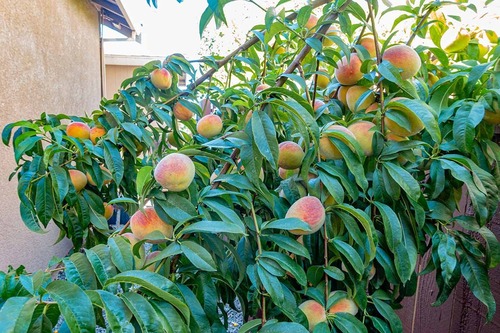
If you’re craving fresh peaches but lack the space for a full-sized tree, dwarf peach varieties are the answer. These compact trees produce sweet, juicy fruit and are specifically bred to grow in smaller spaces, making them perfect for container gardening.
- Growing Requirements: Dwarf peaches need at least 6 hours of sunlight daily and well-draining soil. Water regularly, especially during the fruiting period, and ensure the soil remains slightly moist. Fertilize once or twice during the growing season with a balanced fertilizer.
- Varieties to Try: ‘Bonanza’ and ‘Garden Gold’ are excellent dwarf varieties that thrive in containers.
- Pro Tip: Peaches are prone to diseases like peach leaf curl, so consider using a preventative spray in early spring before bud break.
These small peach trees are not only productive but also add aesthetic beauty to your garden with their spring blossoms.
6. Pomegranates
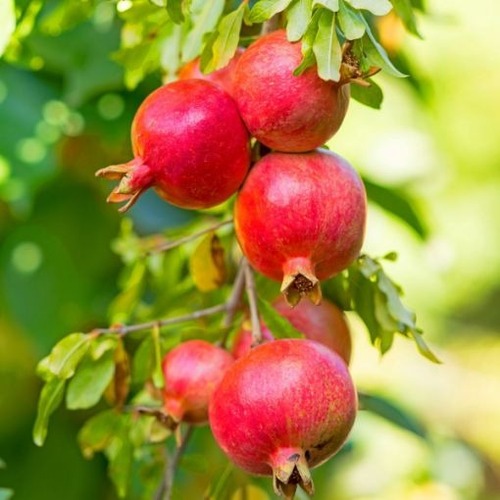
Pomegranates are known for their health benefits and unique, tart flavor. Dwarf varieties of pomegranates, like ‘Nana,’ are perfect for container gardening. These small, bushy trees produce vibrant flowers followed by small yet flavorful fruit, even in small garden spaces.
- Growing Requirements: Pomegranates prefer full sun and thrive in warm climates. They tolerate dry conditions once established but need regular watering during the fruiting season. Use well-draining soil to prevent root rot.
- Varieties to Try: ‘Dwarf Nana’ is the most popular pomegranate variety for small spaces and containers.
- Pro Tip: Pomegranates are self-pollinating, so you don’t need more than one tree to produce fruit, making them ideal for small gardens.
With their decorative appeal and nutritious fruit, pomegranates are a smart choice for space-limited gardeners.
7. Bananas (Dwarf Varieties)
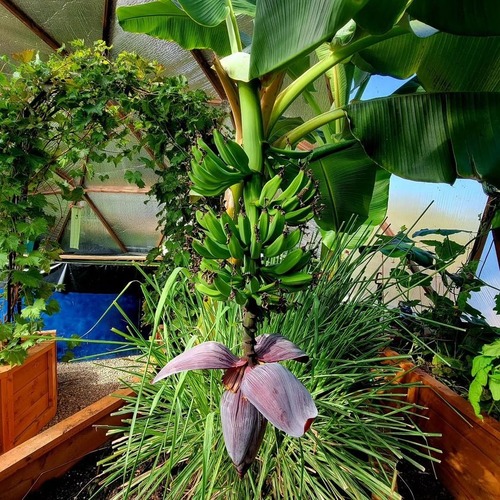
Growing bananas in small spaces is possible with dwarf varieties like ‘Dwarf Cavendish.’ These compact banana plants can be grown indoors or outdoors in containers. They may not grow as tall as regular banana plants, but they still produce small, delicious bananas.
- Growing Requirements: Bananas thrive in full sun and warm temperatures. They prefer rich, well-drained soil and consistent moisture. Bananas are heavy feeders, so regular fertilization is essential for healthy growth.
- Varieties to Try: ‘Dwarf Cavendish’ is the most popular compact variety, making it perfect for small gardens or patios.
- Pro Tip: If growing bananas in a cooler climate, bring them indoors during the winter to protect them from frost.
Banana plants are a striking addition to any small space garden, adding a tropical vibe along with edible fruit.
8. Blackberries (Dwarf Varieties)
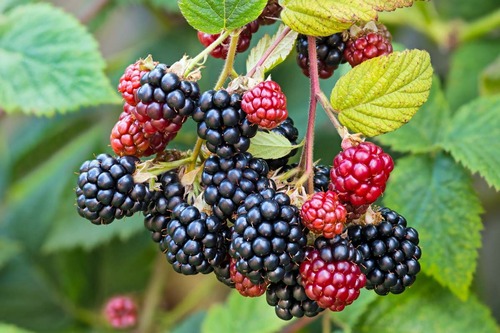
Blackberries are another excellent fruit to grow in small spaces, especially thornless dwarf varieties. While traditional blackberry bushes can sprawl, compact varieties are ideal for container growing, and their upright growth habit makes them a good fit for vertical gardens or small patios.
- Growing Requirements: Blackberries need full sun and well-drained soil. They benefit from support, such as a trellis or a plant stake, to help keep their canes upright and manageable in a container.
- Varieties to Try: ‘Baby Cakes’ is a thornless dwarf variety perfect for container gardening.
- Pro Tip: Prune blackberries annually to encourage new growth and higher fruit yields the following season.
Blackberries are hardy, easy to grow, and a great option for small spaces, yielding delicious fruit with minimal effort.
Tips for Growing Fruits in Small Spaces
- Choose the Right Containers: Select containers that are large enough to accommodate the root system of your fruit plants. Pots should have good drainage holes, and consider using lightweight materials like plastic or fabric pots to make moving them easier.
- Vertical Gardening: Train fruiting vines like passion fruit, blackberries, and grapes to grow vertically along trellises, fences, or walls. This helps save valuable floor space.
- Fertilize Regularly: Fruit trees and plants in containers typically need more frequent feeding than those in the ground. Use a balanced, slow-release fertilizer or specific fruit tree fertilizer to ensure healthy growth and fruit production.
- Proper Pruning: Pruning is essential for keeping plants small and productive in confined spaces. It also promotes airflow and reduces the risk of diseases, which is especially important in compact growing areas.